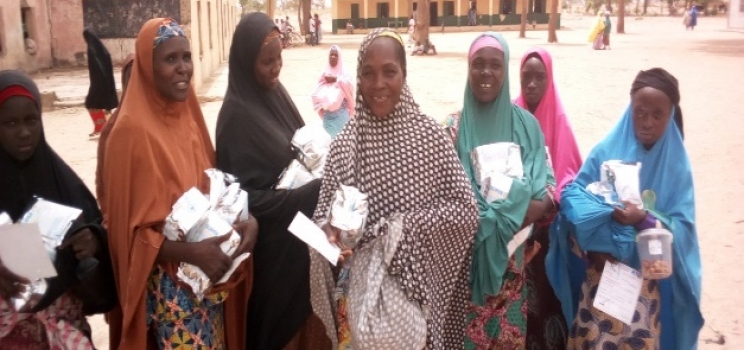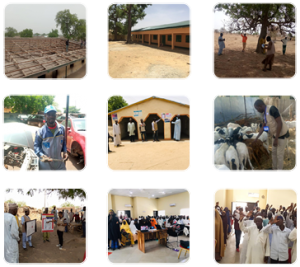Diet support addresses problem of malnutrition among Vulnerable Population
“I am very grateful; this intervention is a life saver. It has benefited me and helps my children grow healthier. All I can say is that I hope it keeps coming”
May 2018 – Outside the famous Emir’s palace in Buni Yadi, an edifice that once served as the command center for Non State Armed Group, the dreaded Boko Haram, Zara Usman. 35, a mother of 8, from Mandunari community in Gujba LGA tells her story on how WFP’s Blanket Supplementary Feeding Program BSFP intervention came to her 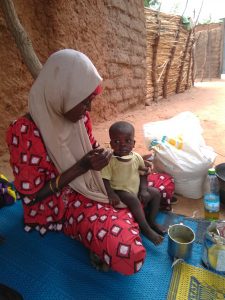 aid at a life-threatening and trying moment. Sitting under a Nim tree with her eleven months old baby, surrounded by other women in what now appears to be a safe, calm atmosphere; Zara recalls the tragedy that warranted the lifesaving intervention by WFP.
aid at a life-threatening and trying moment. Sitting under a Nim tree with her eleven months old baby, surrounded by other women in what now appears to be a safe, calm atmosphere; Zara recalls the tragedy that warranted the lifesaving intervention by WFP.
“It was not easy for me, my family and our community. We escaped advancing book haram attacks. We left our village that day at about 3 AM but I can’t really recollect the actual date but it was in 2014” she said. I and my family fled and left all that we had behind. All we were thinking about at that point was to save our lives”
Violent conflict and emergencies have a shocking wave on people’s lives. The effect on women and children can be particularly severe, both emotionally and materially, worst still, if they are pregnant. The Boko Haram conflict ruthlessly disrupted livelihoods and caused high levels of displacement in Northeast Nigeria.
“We returned to our community in late 2015 after escaping boko haram violence to meet only ruins. All that we had, our food stockpile, livestock, houses and everything gone. I lost two of my children at the peak of the insurgency because it was difficult for us to find food during the heat of the conflict. The one I was breastfeeding then, is always sick and looking emaciated. When we returned, things became tougher. With my remaining six children we have to manage what we can get anywhere because we lost our means of livelihood. Until World Food came to our rescue” Zara said.
Her story did not end there; shortly after she and her family returned, Zara who is now a beneficiary of Blanket supplementary Feeding Program, an intervention of WFP, recalled further how her baby girl, who was breastfeeding looks always weak. Diarrhea and underfeeding had hit the child hard. She had become very weak and found it difficult to even play around. Her husband had no money. Food and basic supplement were rare.
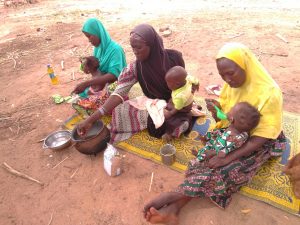 As the military gained upper hand against the insurgents making communities more accessible, WFP came in with its nutrition support program. In Yobe, just like other areas in the Northeast, acute malnutrition is prevalent among children, and the risk of food shortage remains high, particularly in areas that are inaccessible to humanitarian organizations. Just like Zara, majority of women in the 5 wards of Gujba LGA namely Buni lawanti, Gujba town, Wagir, Dadingel and Mundinari in Yobe state, where CCDRN as a cooperating partner is managing the distribution of Basic Supplements Feeding Program also had their own share of the predicament. But all this has changed now thanks to the lifesaving assistance from WFP.
As the military gained upper hand against the insurgents making communities more accessible, WFP came in with its nutrition support program. In Yobe, just like other areas in the Northeast, acute malnutrition is prevalent among children, and the risk of food shortage remains high, particularly in areas that are inaccessible to humanitarian organizations. Just like Zara, majority of women in the 5 wards of Gujba LGA namely Buni lawanti, Gujba town, Wagir, Dadingel and Mundinari in Yobe state, where CCDRN as a cooperating partner is managing the distribution of Basic Supplements Feeding Program also had their own share of the predicament. But all this has changed now thanks to the lifesaving assistance from WFP.
“Now, this helps you have been giving us has brought about great improvement to me as a breastfeeding mother and my child. Whenever I take these supplements, I discover that I produce quality breast milk to breastfeed my child and you can see how the baby is looking strong and healthy” says Zara, with a broad smile which erupted into laughter. “These supplements make our children stronger and healthier. I rarely spend money on drugs and hospitals. In fact, I also make this supplement for the rest of my children and they take and enjoy it” she added.
In response to widespread food insecurity and alarming rate of malnutrition, WFP has been reaching out directly and through its partners to vulnerable populations. Zara now believes that she is in WFP’s debt forever. All she could think of is gratitude for the assistance she has been receiving from the World Food Program.
“I am very grateful; this intervention is a life saver. It has benefited me and helps my children grow healthier. All I can say is that I hope it keeps coming” says Zara who looked up shyly at the interviewers with a broad smile lightening her face.
Many other beneficiaries in Gujba, shares Zara’s sentiment. 25 year Old Falmata Buba Shetimma from Gujba town says of her experience, “We all abandoned our community and means of livelihood as a result of the Boko Haram insurgency. When we returned we discovered that everything that we use for sustenance is gone. This intervention helped us a great deal. It eased our sufferings and we are thankful. Honestly this supplement has been helping our children and it has been helping to make them look strong and healthy. I am honestly satisfied with the distribution process because the entire process was flawless Please we need you to increase our ration of the supplement”.
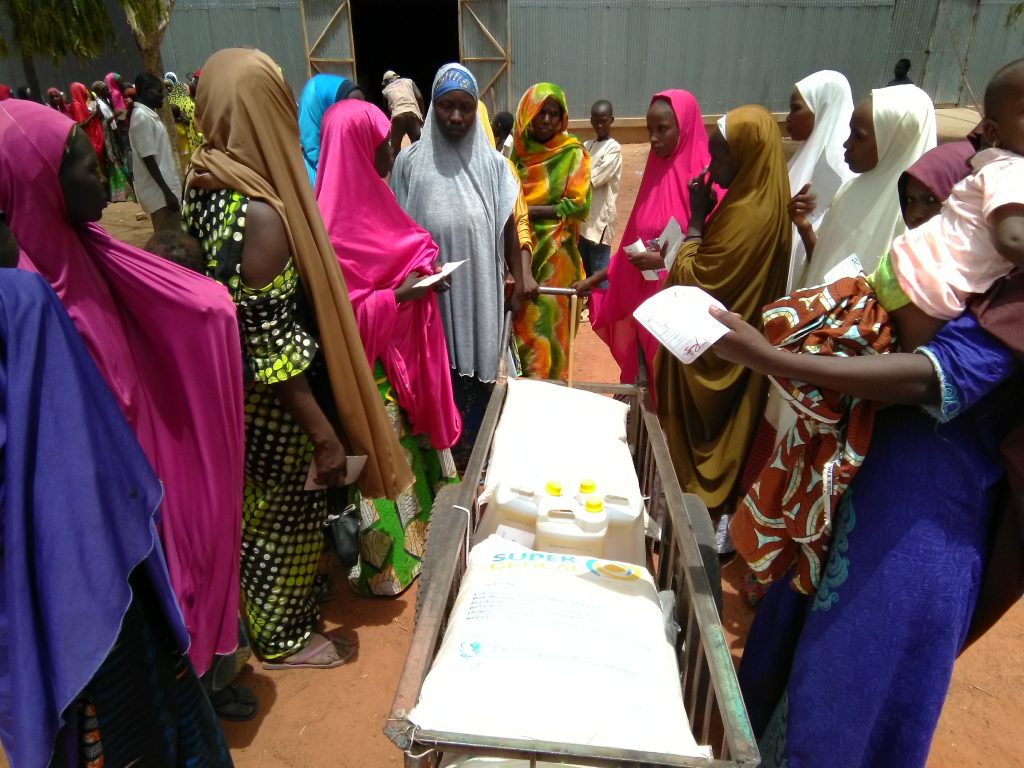
To Ladidi Abdullahi, 30, a mother of four from Mandunari, in Gujba LGA, the Basic supplement Feeding Program was a miracle. It came as a savior in time of great need.
“I am a beneficiary of this intervention and I am grateful for this help from WFP. Beyond giving us these supplements, we have been thought and properly guided on how to prepare this supplement for eating. We are really enjoying this. It is making our children look healthy. This insurgency made us abandoned our homes and most of us lost lives during the escape. The help we have been getting from you is easing our sufferings. This nutrition aid has boosted the health of our children and those of us who are mothers. This supplement is important. Since we started getting it we have seen a lot of improvements. Previously, we hardly get food to eat but now with this intervention, even without food I can get quality breast milk for my baby”. Ladidi said
On her part, 30 years old Hafsat Ibrahim, a mother of 7 children, had lived in Azare but was displaced by the insurgency. She now lives as an IDP in Buni Lawante. “The insurgents destroyed everything we had including our hospitals, houses properties and other things” she said. Hafsat is very happy for the assistance she has been receiving from WFP via its partners. “I am happy with this intervention because it has been very useful. As you can see, we came out thinking that it would be distributed today. It has helped us a lot. Our children are taking it and are now looking very healthy unlike before when hunger and starvation led to malnutrition but this is all over now thanks to this intervention. Those distributing our ration to us have been very kind. They even go to the extent of teaching us how to prepare the food supplement before eating. May God reward them”
In April of 2018 alone, CCDRN carried out BSFP distribution in five (5) wards of Gujba LGA which included Buni lawanti, Gujba, Wagir, Dadingel and Mundinari wards, on behalf of WFP. A total number of 6492 beneficiaries (children) 6-23 months and 24-59 months as well as additional 5840 Pregnant and Lactating Women PLWs were covered in the five wards.
At each of the wards, WFP’s cooperating partners, Centre for Community Development and Research Network carried out sensitization prior to commencement of distribution to inform beneficiaries about the commencement of the distribution. CCDRN has since instituted Food Committee in each of the respective targeted wards. The committee has five women as members in each ward to assist the Nutrition assistant in explaining ration and supplements preparation to beneficiaries for intake at every ward progressively.
According to WFP, its emergency response in Northeast Nigeria emphasizes a preventative nutrition approach that delivers both nutrition specific and nutrition sensitive interventions to prevent and manage malnutrition amongst the most vulnerable populations. With an emphasis on children under five years and women of reproductive age (15 to 49 years). WFP’s integrated and multisectoral actions aim to stabilize and improve the nutrition situation, including investments in dietary diversity, and linkages with healthcare, education and improved water, sanitation and hygiene practices.
WFP provides preventative nutrition assistance to children aged 6-23 months as well as pregnant and lactating women (PLW). These vulnerable children and women received specialized nutritious foods, screening for malnutrition, health, nutrition and WASH messages through WFP’s blanket supplementary feeding programme being managed by Centre for Community Development and Research Network for communities within five wards in Gujba Local Government Area of Yobe state.
